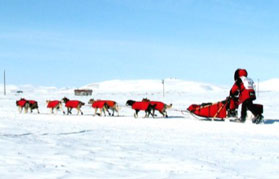Invasive Plants and Agricultural Pest Management
Welcome to Alaska's Invasive Plant Program. Our program coordinates prevention, outreach and management strategies for invasive plant issues through collaboration with land managers, agencies, organizations and policy makers across Alaska. These efforts are guided by the implementation of our Strategic Plan and relevant noxious weed regulations and policies. Our goal is to help keep Alaska's pristine landscapes and natural resources free from impacts of noxious and invasive plants.
PMC Programs
- PMC Home Page
- Horticulture
- Industrial Hemp
- Invasive Plants
- Plant Pathology

5310 S Bodenburg Spur
Palmer, AK 99645
Phone: 907-745-4469
Fax: 907-746-1568
Mon. - Fri.
8 a.m. - 4 p.m.
Click Map For Directions
View Larger Map
Weed Free Forage
Alaska's Weed Free Forage program offers certification for forage and straw products. Straw and hay can be certified by an inspector who has attended training in the past five (5) years. The certified field must be inspected within 10 days of harvest, be free of the listed weed species and meet other minimum program standards
Weed free forage and straw provide consumers the opportunity to help prevent the spread of weed species to places they visit or manage. Certified Weed Free Forage is also a value added product for farmers.

Current and potential markets for weed free forage and straw include:
- Mushers
- Manufacturing of erosion control materials
- Feed or bedding for pack animals
- Livestock owners concerned about introducing weeds onto their farm or land
For information on becoming a producer, buying weed free forage products or becoming an inspector follow the links below. For other questions, please contact your local Soil and Water Conservation District or the Division of Agriculture.
Weed Free Forage Information
The Weed Free Forage (WFF) program is a voluntary program that is offered at no cost to the producer (other than the purchase of the twine for baling). The program minimum standards must be met, and the inspection performed within 10 days of harvest. Certified products are denoted by a special colored twine that is available to participating producers through the program.
If you would like to participate in the program or would like to schedule an inspection, please contact your local Soil and Water Conservation District or the Division of Agriculture.
Alaskan consumers have many uses for Weed Free Forage and Straw. If you are traveling into the backcountry with your dogs or pack animals, your bedding and feed can contain unknown weed seeds which can establish in sensitive or pristine areas. If you are interested in feeding your livestock without introducing new weeds to land you own or manage, WFF products are an option for you.
The Weed Free Certification Programs strive to slow the spread and limit the pathways for introduction of noxious or undesirable weeds. Contact your local Soil and Water Conservation District for a list of participating producers. Or visit your local feed store and ask if they sell "Certified Weed Free" Hay or Straw. Remember this is a specialty product and large orders of material should be coordinated with producers well in advance.
Inspector trainings are held each spring at the Alaska Plant Materials Center in Palmer. The course covers inspection protocol, minimum standards, species identification and proper documentation. A certification is good for 5 years, though inspectors are encouraged to attend trainings annually to keep up with program changes and to refresh your plant identification skills. In addition to the classroom training, in 2012 we offered our first webinar to include people that could not travel to Palmer. We hope to continue this in future years.
If you are interested in becoming an inspector or would like more information, contact the Division of Agriculture.
Weed Free Forage and Straw - Resources:
- Forage Inspection Standards
- Weed Free Forage Certification List of Weed Species
- Weed Free Forage/Straw - Inspection Request Form
